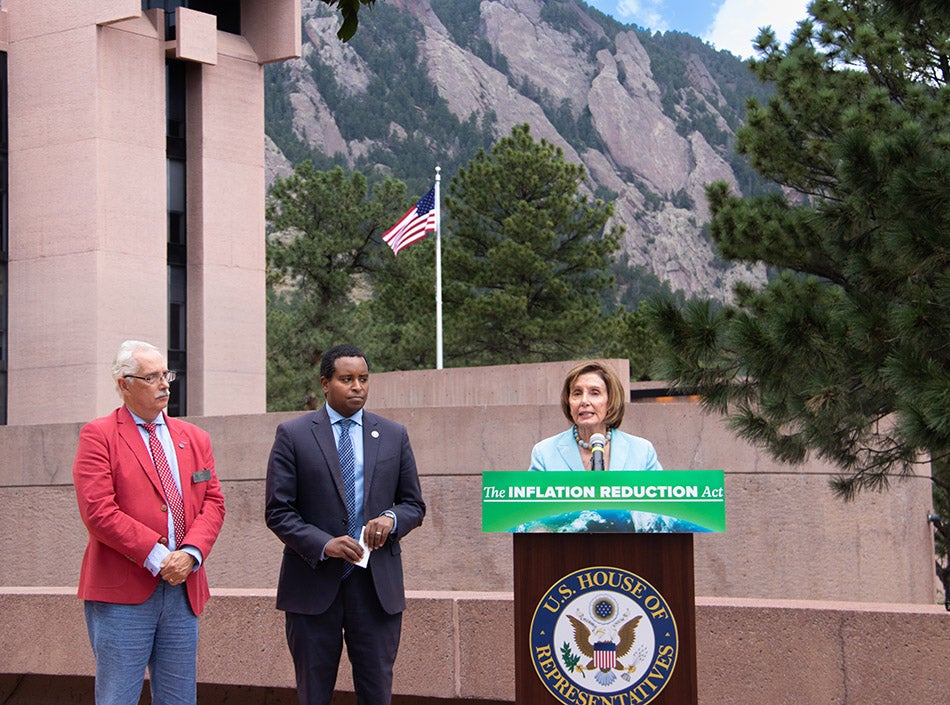Scientists brief Pelosi and Neguse on research advances
The House speaker and local congressman visit the Mesa Lab
Sep 1, 2022 - by David Hosansky
Sep 1, 2022 - by David Hosansky

House Speaker Nancy Pelosi pauses while on a tour of the NCAR Mesa Lab in Boulder, Colorado. With Pelosi, from left to right, are NCAR Director Everette Joseph, Congressman Joe Neguse, UCAR President Antonio Busalacchi, and UCAR science educator Tim Barnes.
The National Center for Atmospheric Research (NCAR) today welcomed U.S. House Speaker Nancy Pelosi and Congressman Joe Neguse to the Mesa Lab in Boulder, Colorado, and provided briefings on new advances in climate and weather research.
Pelosi and Neguse visited NCAR following congressional passage of the Inflation Reduction Act, which makes investments in crucial research in climate and weather as well as in new energy technologies. The law is projected to significantly reduce U.S. emissions of greenhouse gases that warm the planet.
“It is a great honor to host Speaker Pelosi and Congressman Neguse and to share the latest research into climate change and weather,” said Antonio Busalacchi, president of the University Corporation for Atmospheric Research (UCAR). “The Inflation Reduction Act will support our efforts to learn more about the Earth system in order to help protect life and property and strengthen the nation’s economy. The wildfires and flooding in our own community has demonstrated that all of us are on the front lines with respect to climate and weather disasters, and we very much appreciate Speaker Pelosi and Congressman Neguse’s support of the science that is essential to better safeguard society.”
UCAR is a nonprofit consortium of 122 colleges and universities focused on research and training in Earth system science. It manages NCAR on behalf of the National Science Foundation (NSF).
Pelosi and Neguse took a tour of the Mesa Lab with UCAR Science Education Specialist Tim Barnes before engaging in a roundtable discussion with Busalacchi, NCAR Director Everette Joseph, and NCAR scientists Gerald Meehl and Gretchen Mullendore. Also participating in the roundtable discussion were Alexandra Isern, assistant director of the NSF Directorate for Geosciences, and scientists and officials with NOAA and Boulder County.
“What you are working on is so fundamental,” Pelosi told the scientists. “I thank all of you for what you do.” She said the tour of the building had been “transformative.”
After the briefing, Pelosi added, "It was a privilege to visit NCAR’s cutting-edge Mesa Laboratory, seeing firsthand how federal labs are blazing new trails in our nation’s fight against the climate crisis. House Democrats are grateful to the entire UCAR team for its leadership in turbocharging scientific research and putting America on a path to saving the planet. The House was proud to deliver historic research investments through our Inflation Reduction Act, and we remain laser-focused on working alongside UCAR to continue spurring innovation in Colorado and across the nation.”
Neguse praised the science conducted at NCAR and other labs across the state.“Here in Colorado, federal scientists are continuing to develop and produce groundbreaking research that is literally forging the pathway for new energy and climate solutions,” he said. “It gives me hope that we can, in fact, save the planet.”
NSF Director Sethuraman Panchanathan said he very much appreciated the visit by Pelosi and Neguse.
“We are grateful for the opportunity to host Speaker Pelosi and Congressman Neguse at this impressive facility that has been integral to researching climate for decades,” he said. “NSF remains dedicated to understanding the entire ecosystem of this grand challenge--what we know, what we have yet to learn and what we can do to better prepare for the future. We appreciate the continued support from Congress and look forward to strengthening our partnerships to further explore Earth's climate system and how innovative solutions can build resilient futures.”
NCAR Director Everette Joseph emphasized the importance of continued research into the climate system.
“No one is immune to the impacts of climate change, as we at NCAR know too well after experiencing destructive wildfires in our own community,” he said. “I am very grateful to Speaker Pelosi and Congressman Neguse for visiting us today and for their support of research into weather and climate that is vitally needed to improve predictions and help make our society more resilient.”
